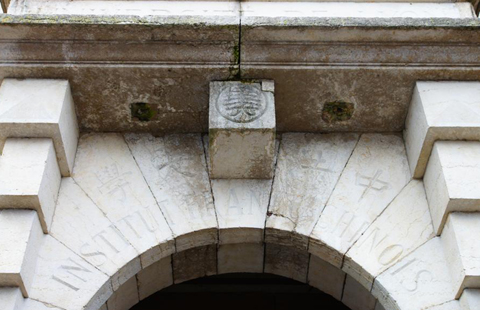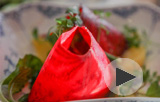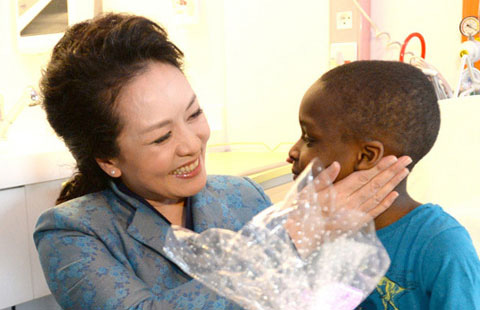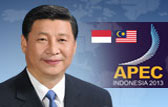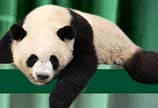
Classical TCM a dying art
Updated: 2013-10-25 10:01
By Matt Hodges (China Daily Europe)
Comments Print Mail Large Medium Small
Its worst enemies may be many of those in its own ranks, German practitioner says
Traditional Chinese medicine may soon find itself on the endangered list because of skepticism from within its own ranks, a German practitioner of the 2,000-year-old science says.
While TCM has been criticized over its use of toxic compounds, a growing distrust of its ancient healing methods has made its own practitioners its worst enemy, said Dr Heiner Fruehauf, who claims to have cured himself of cancer using its original precepts.
"One of the biggest problems today is that many doctors teach traditional Chinese medicine, but they don't fully believe in it," said Fruehauf, founding professor of the School of Classical Chinese Medicine at the National College of Natural Medicine in Portland, Oregon.
This is leading to a dangerous form of cross-pollination with Western medical practices that is divorcing TCM from its holistic roots and resulting in classical practices being forgotten, he said.
"We've reached an end stage where the real Chinese medicine that is a science in its own right is slowly disappearing and where we have some kind of hybrid. The modern version we have today is really a combination of Western medicine and TCM. I was also skeptical at first, and used to mix both."
Fruehauf made his remarks at a forum in Shanghai last month.
Such skepticism has led to a rise in herbal-remedy prescriptions containing similar ingredients to those available and clinically tested in Western medicine. By the same token, ancient practices such as Daoist alchemy, pulse diagnosis and qigong (Chinese breathing exercise), all of which Fruehauf specializes in, are falling by the wayside.
However, there is an urgent need to find new treatments for serious diseases, and looking back to the origins of TCM may throw up some solutions, says Steve An Xue, vice-president of the International Homeopathic Medical League's Chinese branch.
"About 40 percent of people living in North America will be diagnosed with one form of cancer if the current trend continues," he said.
As Fruehauf delved deeper into TCM, he became convinced it could be used to cure not only cancer, but also various forms of heart disease, diabetes and other chronic ailments.
He bases his argument on ideas that are thousands of years old and can be found in such canonical texts as the Yellow Emperor's Inner Canon, a de facto primer on TCM, and the I Ching, an even older book that draws on cosmology and divination.
"There are so many different ways of treating diseases and ailments through fasting, through visualization, through things that you could only explain as magic from a modern perspective," Fruehauf said. "There are hundreds of these forgotten methods that people in the villages and mountains still know, but which are not being taught anymore."
In many ways TCM is enjoying a renaissance. The number of its practitioners is rising, acupuncture is still considered trendy, and Chinese lawmakers last month called for its more widespread use in controlling infectious diseases such as SARS and avian flu.
Citing government statistics, Xinhua reported recently that H7N9-virus patients had a mortality rate of just 9.1 percent if treated with a combination of TCM and Western methods, whereas one in three patients who relied on Western medicine alone died.
In 2011 a Chinese scientist received an award after drawing on Chinese medicine to produce the key ingredient in the world's leading anti-malaria drug. Tu Youyou of Zhejiang province received the award for her decades-long work in isolating artemisinin from sweet wormwood.
Despite these achievements, Fruehauf says, it is debatable whether TCM is enjoying a new golden age.
"While we probably have more licensed Chinese medicine practitioners in China, as well as in the West, than ever before, the quality of those people is lower than ever before. So that's what I'm worried about."
Part of the problem results from talented students chasing more lucrative jobs in business or law, and part of it is cultural. Fruehauf said there has been a growing distrust of TCM in China since Sun Yat-sen founded the Republic of China in 1912.
"It's a reality that [the vast majority] of students at a Chinese medicine school, in China especially, don't want to be there. They just didn't pass the exam for the regular medicine school. So, right from the get-go, they're not that interested.
"Most of them, five years later, make their money from prescribing antibiotics and other Western medicines."
Fruehauf, a renowned sinologist, was born in Germany to a family of medical doctors but has called the US home for much of the last 20 years. He spent two years studying at Fudan University in Shanghai before gaining his doctorate from the Department of East Asian Languages and Civilizations at the University of Chicago.
He was later diagnosed with cancer, and he declined a faculty position at Harvard and returned to China to study Chinese medicine in Chengdu. He had surgery to remove a tumor but declined chemotherapy treatment and says he found success through TCM instead.
Since then, he has spent about one month each year taking groups of 20 to 30 people to secluded mountain monasteries and retreats in exotic locations like Sichuan and Yunnan to practice tai chi and other forms of spiritual cultivation with his Chinese teachers.
Dr Li Xin, a consultant for the Shanghai Natural Path Academy, said: "In ancient China, doctors had to study shadow boxing, sitting and meditating, calligraphy, painting and musical instruments to fully comprehend the energy rhythms of the body and the cosmos.
"They were taught to understand, for example, how different tunes related to different moods, and the symbiotic effect of the relationship between human beings and their environment. So if medical students are not trained in the traditional mould, they cannot fully grasp the nature of intangible things like qi."
Criticism of TCM in recent years over its use of toxic herbs that can harm people's health has prompted calls outside China for greater regulation of the industry. Beijing began addressing the issue in July by launching a national crackdown on all counterfeit medicines.
But Fruehauf sees the media din as part of a backlash by Western interest groups aimed at constraining TCM's influence.
"Western medicine, by its own admission, is administering toxic substances every day, and people are dying in the thousands every day. Of course, it's possible that some people can get liver damage from herbs that are heavy-metal polluted, or herbs that are wrongly prescribed, but in comparison to how many tens of thousands of people get liver toxicity from Western medicine, there's just no comparison."
While skeptics may roll their eyes at TCM's use of snake skin and other anachronistic recipes, its use of plants containing aristolochic acid, found in wild ginger, is more controversial. The Food and Drug Administration in the US issued a safety alert about this in May as it has been associated with nephropathy and cancer. The compound is banned in several countries, including England.
In 2010 a Chinese doctor was prosecuted in Essex after prescribing a medicine containing aristolochic acid to a woman for several years. She developed kidney disease and cancer of the upper urinary tract. Last month, British health regulators issued warnings about high levels of lead and mercury in some TCM treatments.
"It has got to the point where even people in our profession are tooting the horn," said Fruehauf, adding that legal concerns over the use of certain herbs have brought him into conflict with his own school in Oregon. Such fears are misguided, he said.
Unlike Western medicine, the end goal of TCM is self-empowerment, he said.
"Our job is really to educate people to empower themselves so they don't need us. People have become brainwashed to think that we can just check ourselves into this glass palace where they can fix everything, like a car. And that's not the case.
"Of course, as a Chinese medicine practitioner, I'm biased. I think that Chinese medicine has something that's much older than Western naturopathic medicine and has a much more sophisticated theory behind it."
matthew@chinadaily.com.cn
|
Acupuncture is one of the most widely practiced Chinese therapies in the country and is gaining increasing popularity in the West. Provided to China Daily |
(China Daily European Weekly 10/25/2013 page28)

